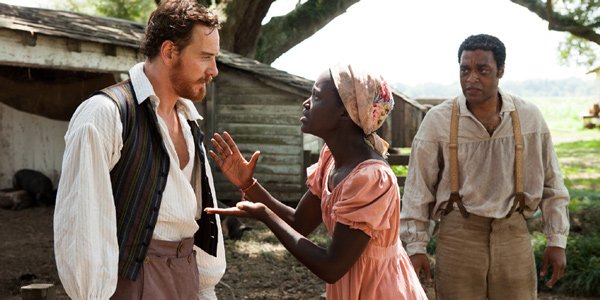Oscar Eye: Awards Season Narratives And What They Mean For 12 Years A Slave And Gravity

Let's talk about the word "narrative."
It pops up in Oscar campaigns constantly, and often can mean essentially whatever the pundit in question wants, a way for them to tell themselves-- and hopefully those listening-- a story about why a certain film has an edge. The narrative of Argo's Best Picture win was based around Ben Affleck's Best Director snub, with a healthy side serving of Hollywood's own self-regard in rewarding a story about how a fake movie saved lives. The narrative of The Artist was a loving return to the golden age of silent movies, the narrative of The Hurt Locker was Hollywood finally dealing with the Iraq War + the first female Best Director winner, the narrative of Slumdog Millionaire was a underdog movie about an underdog hero… you can find one for any of them, whether or not they went on to win the prize.
Narratives are important because Oscar season is long, and no matter how good a film is, you're going to be sick of talking about it by January unless there's an external story around it that you can root for. The stories that win Best Picture aren't just the ones told on screen, but the ones about the story on screen, the ones that tell voters why it's Right or Important to vote for Argo or The Hurt Locker. There are even narratives that allow you to ignore what's Important and pick something that makes you feel good-- ads for The King's Speech that trumped its emotions gave voters permission to go with their hearts and pick it over the pricklier, more intellectual The Social Network. These narratives start before films even open, like when everyone eyes Steven Spielberg's Lincoln sight unseen and calls it a frontrunner, and change constantly throughout the season depending on what the competition is dishing out.
Powerful narratives have already started for several of the biggest contenders so far, but probably none more so than 12 Years A Slave, which is looking like a Best Picture frontrunner not only because it is a phenomenal film, but because there's a strong story to tell about it. Several films this year, particularly Fruitvale Station and Lee Daniels' The Butler, seemed to indicate a groundswell of cinematic support for actual, heavy-duty conversations about race and racism in America. When real-life headlines like the destabilization of the Voting Rights Act and the Trayvon Martin verdict happened, it only confirmed each film's resonance. And now, with impeccable timing, comes 12 Years A Slave, which is both a better movie than either of the others mentioned and digs further back, unblinkingly examining the country's original sin of slavery and depicting it more powerfully than perhaps any other film. Like Schindler's List, 12 Years A Slave has arrived with the kind of reviews that don't just say it's a good movie, but essential to see. And we all know how that kind of buzz translated for Schindler's List at the Oscars.
12 Years A Slave still has another month before it opens, and many months after that before the Oscars ceremony on March 2, which means there are more narratives to come, especially because that level of overwhelming, Big Important Movie hype is almost impossible to sustain (see, again, Lincoln). There will be another narrative about Chiwetel Ejiofor, who is poised to be among a history-making class of African-American Best Actor nominees if he, Idris Elba, Michael B. Jordan and Forest Whitaker all snag nominations. Still another about director Steve McQueen, who could be the first African-American director with a serious chance of winning Best Director-- but who also is visibly impatient with the glad-handing and empty praise of awards season, and might fare poorly with the endless schmoozing an Oscar campaign requires. There's a story to tell about Michael Fassbender (a genius who has yet to be nominated), about Lupita Nyong'o (a newcomer who blows away her small role), about composer Hans Zimmer (is his one win for The Lion King really enough?), and on and on.
Meanwhile there's also Gravity, the critically beloved technical marvel that has a ton of heat for many technical prizes, but lots of other stories to tell, from director Alfonso Cuaron-- who made a complete masterpiece that the Oscars ignored with Children of Men-- to star Sandra Bullock, who is newly minted Oscar royalty after The Blind Side win and who reportedly does great work here. Gravity also has George Clooney in a supporting role, and you can never, ever underestimate his appeal for awards-- that's one Oscar race narrative that goes unchanged every year.
To stick with the present, the narratives behind this weekend's two big prestige-friendly releases are a little fuzzier, since both of them are more genre-based than your average awards slam dunks. Prisoners boasts a laundry list of previous winners and nominees both in the cast and behind the camera, plus enough solid reviews to turn heads. But it is, at heart, a straightforward procedural drama, and it's unclear if there's enough meat in there to keep a narrative-- yes, that word again-- going throughout the lengthy awards season. Looking a little more promising is Rush, opening in limited release this weekend, with director Ron Howard changing up his style significantly from his last two films, and both Chris Hemsworth and Daniel Bruhl turning in commanding lead performances (though conventional wisdom says that Bruhl will be campaigned as Best Supporting Actor). Prisoners and Rush are both embracing release patterns that make sense for them Prisoners trumping its famous cast and blanketing airwaves with tension-riddled ads, while Rush is taking its time, sort of an adrenaline junkie's art house alternative. But from this point, it seems Rush has more potential to keep its own story out front as the fall moves forward.
Your Daily Blend of Entertainment News
My apologies-- I haven't yet put together this year's charts, following the contenders in order of likelihood, but you can check in on last week's kickoff column, in which I ran down all the major titles both seen and unseen. By next week we'll be near the start of the New York Film Festival, and a few more films like Captain Phillips, Inside Llewyn Davis and Blue is the Warmest Color will be up for discussion. Until then!
Staff Writer at CinemaBlend

